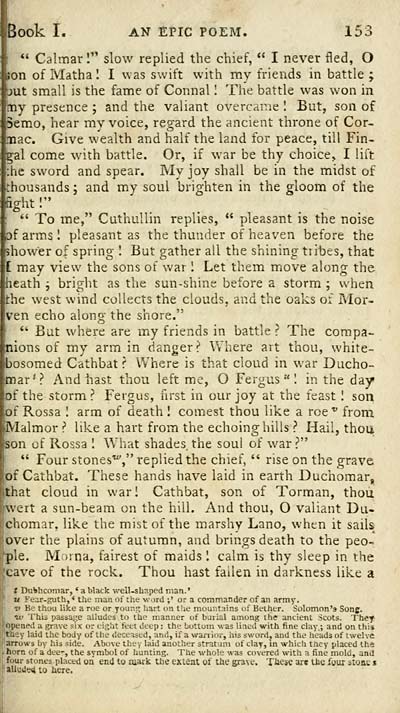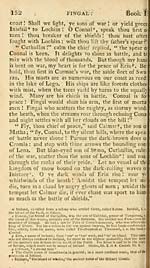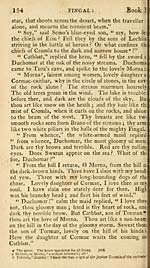Download files
Complete book:
Individual page:
Thumbnail gallery: Grid view | List view

iDOok I. AN EPIC POEM. 153
*' Calmar I" slow replied the chief, " I never fled, O
8on of Matha I I was swift with my friends in battle ;
ont small is the fame of Connal I The battle was won in
tny presence ; and the valiant overcair.e I But, son of
oemo, hear my voice, regard the ancient throne of Cor-
noac. Give wealth and half the land for peace, till Fin-
gal come with battle. Or, if war be thy choice, I lift
;he sword and spear. My joy shall be in the midst of
thousands ; and my soul brighten in the gloom of the
fight!"
" To me," CuthuUin replies, " pleasant is the noise
of arms 1 pleasant as the thunder of heaven before the
shower of spring I But gather all the shining tribes, that
t may view the sons of war 1 Let them move along the
heath j bright as the sun-shine before a storm ; when
the west wind collects the clouds, and the oaks of Mor-
ven echo along the snore."
" But where are my friends in battle ? The compa-
nions of my arm in danger? Vv'here art thou, white-
bosomed Cathbat ? Where is that cloud in war Ducho-
mar'? And hast thou left me, O Fergus"! in the day
of the storm? Fergus, first in our joy at the feast 1 son
of Rossa ! arm of death I comest thou like a roe ^ from
Malmor ? like a hart from the echoing hills ? Hail, thou
son of Rossa 1 What shades, the soul of war ?"
" Four stones^," replied the chief, " rise on the grave
of Cathbat. These hands have laid in earth Duchomar,
that cloud in warl Cathbat, son of Torman, thou
wert a sun-beam on the hill. And thou, O valiant Du-
chomar, like the mist of the marshy Lano, when it sails
over the plains of autumn, and brings death to the peo-
ple. M;)rna, fairest of maids 1 calm is thy sleep in the
[cave of the rock. Thou hast fallen in darkness like a
t Dukhcomar, « a black weU-sh?.ped man.'
u Fear.guth, ' the man of the word ;' or a commander of an army.
V Be thou like a roe or young hart on tlie mountains of Beiher. Solomon's Song.
IV This passage alludes to the manner of burial among ihc ancient Scots. Thef
Opened a grave six or eight feet deep : the bottom was lined with fine clay.; and on this
rhsy laid the body of the deceased, and, if a warrior, his sword, and the heads of twelve
larruws by his side. Above they laid another stratum of clay, in which they placed the
horn of a dee-, the symbol of hunting. The whole was covered with a fine mold, and
four stones placed on end to mark the extent of the grave. TUese are the foui stoae »
bUudwito here.
*' Calmar I" slow replied the chief, " I never fled, O
8on of Matha I I was swift with my friends in battle ;
ont small is the fame of Connal I The battle was won in
tny presence ; and the valiant overcair.e I But, son of
oemo, hear my voice, regard the ancient throne of Cor-
noac. Give wealth and half the land for peace, till Fin-
gal come with battle. Or, if war be thy choice, I lift
;he sword and spear. My joy shall be in the midst of
thousands ; and my soul brighten in the gloom of the
fight!"
" To me," CuthuUin replies, " pleasant is the noise
of arms 1 pleasant as the thunder of heaven before the
shower of spring I But gather all the shining tribes, that
t may view the sons of war 1 Let them move along the
heath j bright as the sun-shine before a storm ; when
the west wind collects the clouds, and the oaks of Mor-
ven echo along the snore."
" But where are my friends in battle ? The compa-
nions of my arm in danger? Vv'here art thou, white-
bosomed Cathbat ? Where is that cloud in war Ducho-
mar'? And hast thou left me, O Fergus"! in the day
of the storm? Fergus, first in our joy at the feast 1 son
of Rossa ! arm of death I comest thou like a roe ^ from
Malmor ? like a hart from the echoing hills ? Hail, thou
son of Rossa 1 What shades, the soul of war ?"
" Four stones^," replied the chief, " rise on the grave
of Cathbat. These hands have laid in earth Duchomar,
that cloud in warl Cathbat, son of Torman, thou
wert a sun-beam on the hill. And thou, O valiant Du-
chomar, like the mist of the marshy Lano, when it sails
over the plains of autumn, and brings death to the peo-
ple. M;)rna, fairest of maids 1 calm is thy sleep in the
[cave of the rock. Thou hast fallen in darkness like a
t Dukhcomar, « a black weU-sh?.ped man.'
u Fear.guth, ' the man of the word ;' or a commander of an army.
V Be thou like a roe or young hart on tlie mountains of Beiher. Solomon's Song.
IV This passage alludes to the manner of burial among ihc ancient Scots. Thef
Opened a grave six or eight feet deep : the bottom was lined with fine clay.; and on this
rhsy laid the body of the deceased, and, if a warrior, his sword, and the heads of twelve
larruws by his side. Above they laid another stratum of clay, in which they placed the
horn of a dee-, the symbol of hunting. The whole was covered with a fine mold, and
four stones placed on end to mark the extent of the grave. TUese are the foui stoae »
bUudwito here.
Set display mode to: Large image | Transcription
Images and transcriptions on this page, including medium image downloads, may be used under the Creative Commons Attribution 4.0 International Licence unless otherwise stated. ![]()
| Early Gaelic Book Collections > Ossian Collection > Poems of Ossian, the son of Fingal > (169) |
|---|
| Permanent URL | https://digital.nls.uk/77921167 |
|---|
| Description | Selected books from the Ossian Collection of 327 volumes, originally assembled by J. Norman Methven of Perth. Different editions and translations of James MacPherson's epic poem 'Ossian', some with a map of the 'Kingdom of Connor'. Also secondary material relating to Ossianic poetry and the Ossian controversy. |
|---|
| Description | Selected items from five 'Special and Named Printed Collections'. Includes books in Gaelic and other Celtic languages, works about the Gaels, their languages, literature, culture and history. |
|---|

